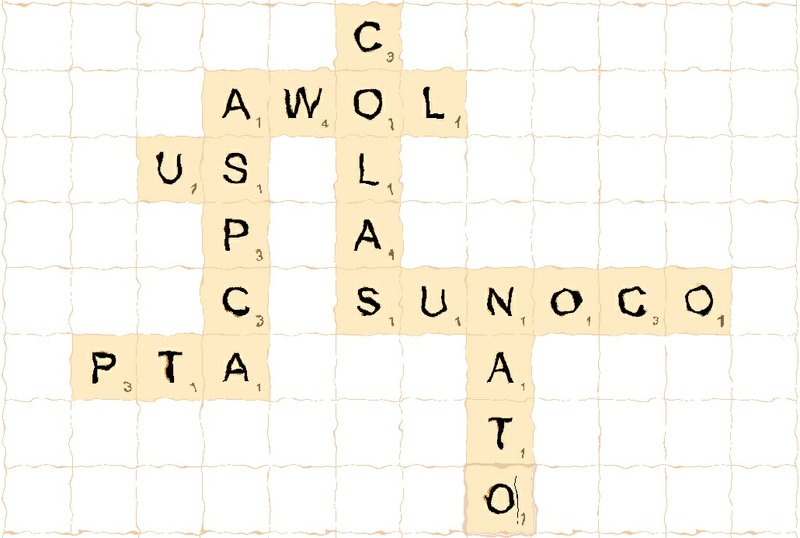Initially, I didn't think I could say a lot about acronyms. I was wrong.
An acronym uses the first letters of a few words to form a new word. The purpose is to shorten a long string of words to one word that is more easily remembered or written.
REM: rapid eye movement, a sleep stage
COLA: cost of living adjustment
CREEP: Committee for the Re-Election of the President
NATO: North Atlantic Treaty Organization
IKEA: Ingvar Kamprad Elmtaryd Agunnaryd. Does anyone else agree that they were wise to go with the acronym?
Roy G. Biv: a memory aid for the color spectrum: red, orange, yellow, green, blue, indigo, violet.
Sunoco: Sun Oil Company
Scuba: Self-contained underwater breathing apparatus
Laser: Light amplification by stimulated emission of radiation
Pog: This is a game from a couple of decades back that involves flipping cardboard disks. Its name came from a Hawaiian beverage brand, Pog, an acronym for "passionfruit, orange, guava." Pog lids were the first disks used in the game. That is strange.
CARE package: This was a new one to me. It originated from supply packages sent after World War II: "Cooperative for American Remittances to Europe."
Sometimes, acronyms come from more than just the first letters of a phrase.
Sonar is SOund Navigation and Ranging.
As with so many grammar matters, people debate the meaning of an acronym. One group says all acronyms are abbreviations but not all abbreviations are acronyms.
Some of the abbreviations are initialisms. Initialisms are formed in the same way as acronyms, but the initials don't form words. People spell out initialisms letter by letter.
FBI: Federal Bureau of Investigation
PTA: Parent-Teacher Association
ASPCA: American Society for the Prevention of Cruelty to Animals
HRSD: Hampton Roads Sanitation District
IBM: International Business Machines
HSBC: Hongkong and Shanghai Banking Corporation.
HBA: Home Baking Association (I didn't make that up.)
And my new favorite:
USAMSMADHS: United States Army Medical Service Meat and Dairy Hygiene School
Opposing groups say initialisms are the same as acronyms. Some dictionaries have started rolling the definition of initialism into the acronym definition. Some note that not everyone agrees they're the same thing. Others are silent on the distinction.
The word "acronym" wasn't used until the 20th century. It came from the Greek roots for "end or tip," and "name." So many military acronyms were created during World War I and World War II that someone decided they should get their own word. "ANZAC" is an example from World War I. It stands for Australian and New Zealand Army Corps.
The new word was similar to and may have imitated "acrostic," a poem or composition that uses the first letter of each line to create a message.
Occasionally, a word moves from being an initialism to being an acronym. "Awol," a military phrase for "absent without leave," was at first "AWOL," with the initials sounded out.
Some creative and cynical people have produced "backronyms" or "bacronyms." The name came from a 1983 Washington Post contest seeking new words. The entry defined a backronym as "the same as an acronym, except that the words were chosen to fit the letter."
Some backronyms are somewhat ludicrous.
Many people have spread the story that Adidas is an acronym for "All Day I Dream About Sex." In fact, the company was named after the German man who founded it, Adi Dassler.
Many say the origin of the name "golf" is "gentlemen only, ladies forbidden."
"Tips" is allegedly from "to insure prompt service."
It's hard to prove these theories about golf and tips, although Snopes, the popular online debunking site, says those theories about "golf" and "tips" are wrong.
And many false tales are spread about the acronymic origin of some expletives. They have been studied and largely disproved.
I would be intrigued to see on a resume: "Spent one year investigating the origin of the acronym for excrement."
One thing may be confusing with acronyms: Are they preceded by an "a" or an "an"? That depends on the pronunciation of the first sound of the word.
If you say "a Federal Bureau of Investigation report," the "a" is used because the first sound after "a" is "fff."
If you say "an FBI report," you use "an" because the first sound you say is "ef."
Acronyms are so omnipresent today that they share a website, Acronym Finder, with initialisms and other abbreviations.
Its home page describes the site as having "more than 1,000,000 human-edited definitions." This frightened me a bit. Isn't all editing done by humans?
Sources: GrammarBook.com, Merriam-Webster, UsingEnglish.com, phrases.org.uk, Oxford Dictionaries, Online Etymology Dictionary, Oregon Health and Science University, Snopes.com, Fowler's Modern English Usage
Style on 01/21/2019
